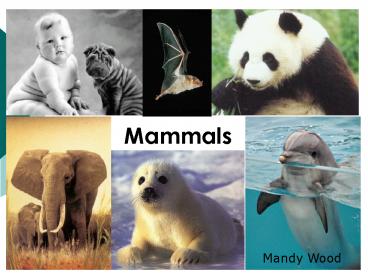Mammals - PowerPoint PPT Presentation
1 / 15
Title:
Mammals
Description:
There are six major classes of animals: fish, amphibians, reptiles, birds, insects, and mammals. ... Amphibians. Reptiles. Birds. Mammals. Insects. Facts about ... – PowerPoint PPT presentation
Number of Views:159
Avg rating:3.0/5.0
Title: Mammals
1
Mammals
Mandy Wood
2
Animal Classes
- There are six major classes of animals fish,
amphibians, reptiles, birds, insects, and
mammals. - We will learn about mammals and how they are
different from the other types of animals.
Amphibians
Fish
Reptiles
Mammals
Birds
Insects
3
Facts about Mammals
- There are about 4,000 types of mammals. But, this
is a small class since there are over 20,000
types of fish and over 800,000 types of insects! - Humans are mammals!
4
Traits Common to All Mammals
- They are warm-blooded.
- They have fur or hair.
- Mammal babies drink milk from their mothers.
- Mammals are vertebrates this means they have
backbones or spines.
5
Warm-BloodedWhat does it mean?
- Warm-blooded means that mammals maintain a
relatively constant and warm body temperature. A
mammals body temperature isnt affected by
outside temperatures. - On the other hand, animals like reptiles are
cold-blooded. The body temperature of
cold-blooded animals changes with the
environment.
6
Hair
- All mammals have hair on their bodies. Bears,
horses, and bats are clearly covered with fur.
Even marine mammals (those that live in water),
have hair, but you would need a microscope to see
it.
7
Mammals Drink Milk
- Baby mammals are born in different ways, but they
all drink milk from their mothers. - Mammal mothers have special milk-producing glands
called mammary glands. Only mammals have these! - Unlike fish or other animals, the babies depend
on their mothers after they are born.
8
Mammals are Vertebrates
- What are vertebrates?
- Vertebrates are animals with a spinal cord
encased in a vertebrae or a backbone.
9
Other Characteristics Common Only to Mammals
- Jaw bones Mammals have a single bone on either
side, but other animals have more than one bone. - Ears Mammals have three bones in their middle
ear. - Hearts The artery leaving our heart curves
differently than any other animals heart. - Diaphragms Mammals have a special sheet of
muscles and tendons called a diaphragm. It
separates the inside of the body into two parts.
10
Classifying Mammals
- Mammals are classified by the way they are born.
There are three main types.
Monotremes
Marsupials
Placental Mammals
11
Monotremes
- They lay eggs! Thats right mammals can lay
eggs! - Common types of monotremes are the duck-billed
platypus and echidnas.
12
Marsupials
- Marsupials are mammals whose young are born very
underdeveloped. Mother marsupials often have
pouches. Their babies crawl into the pouches and
drink their mothers milk. - Kangaroos, opossums, Tasmanian devils, and koalas
are common types.
13
Placental Mammals
- Placental mammals are mammals whose young are
born at a more advanced stage. Before birth, the
young are fed through a placenta. The placenta is
a special organ that delivers oxygen and
nutrients to the young, growing baby. - Common types humans, rodents, elephants, and
whales
14
Summary
- Mammals
- 1) Are warm-blooded
- 2) Have hair
- 3) Drink milk from their mothers
- 4) Have backbones
- There are three types marsupials, monotremes,
and placental mammals. - Humans, dolphins, dogs, bats, and koalas are all
mammals!
15
Assessment
- Now, lets see how much we know about mammals!
Click the link below, and it will direct you to a
document that will test your new knowledge! - Is it a Mammal?
- For more mammal fun, visit these interesting
facts pages! - Mammal Facts Page
- Mammal Safari































